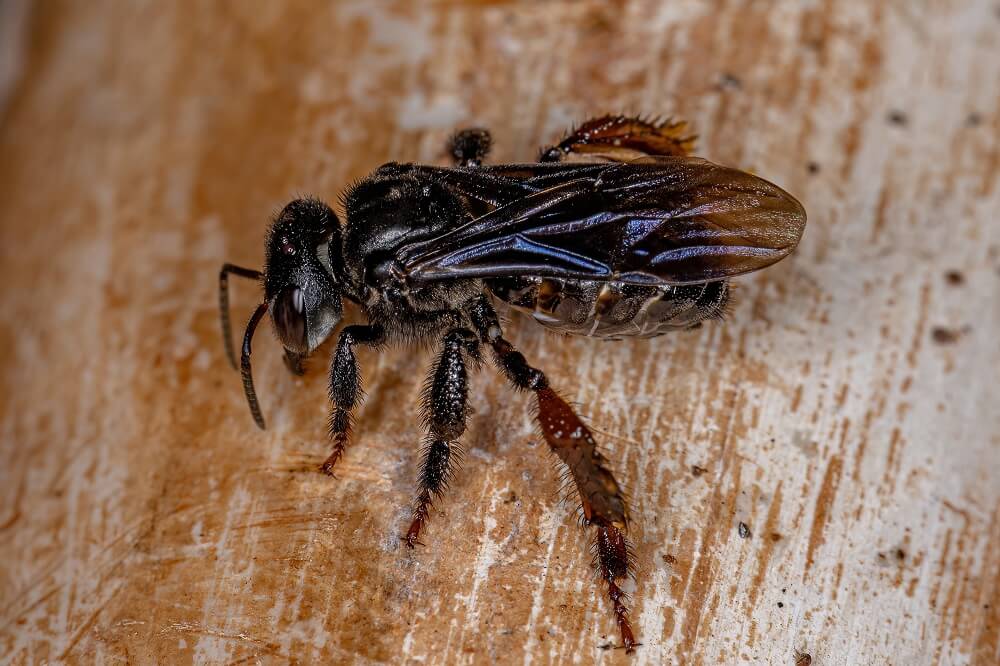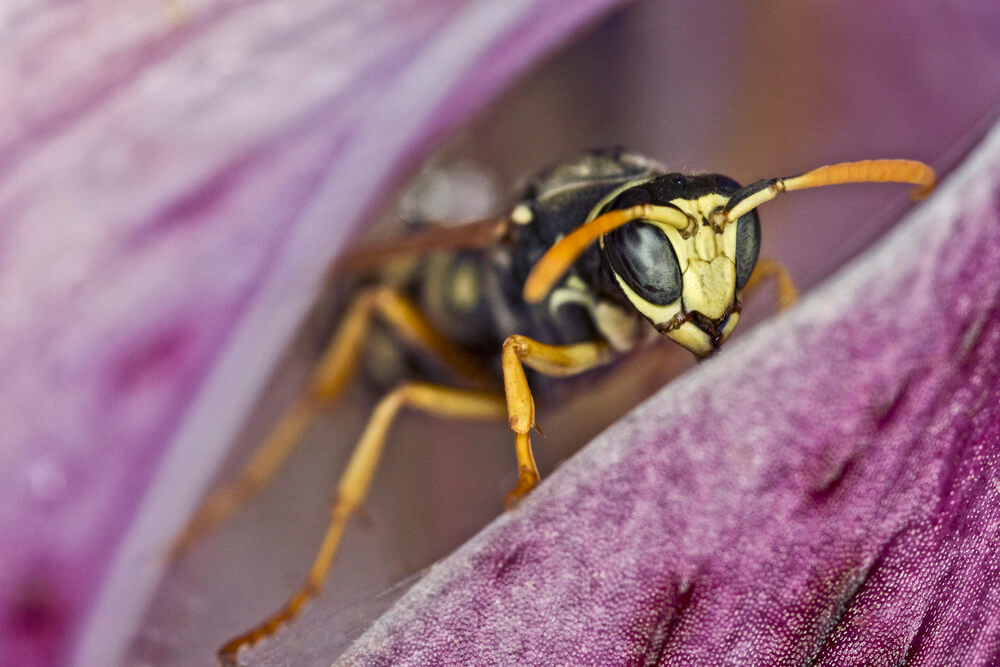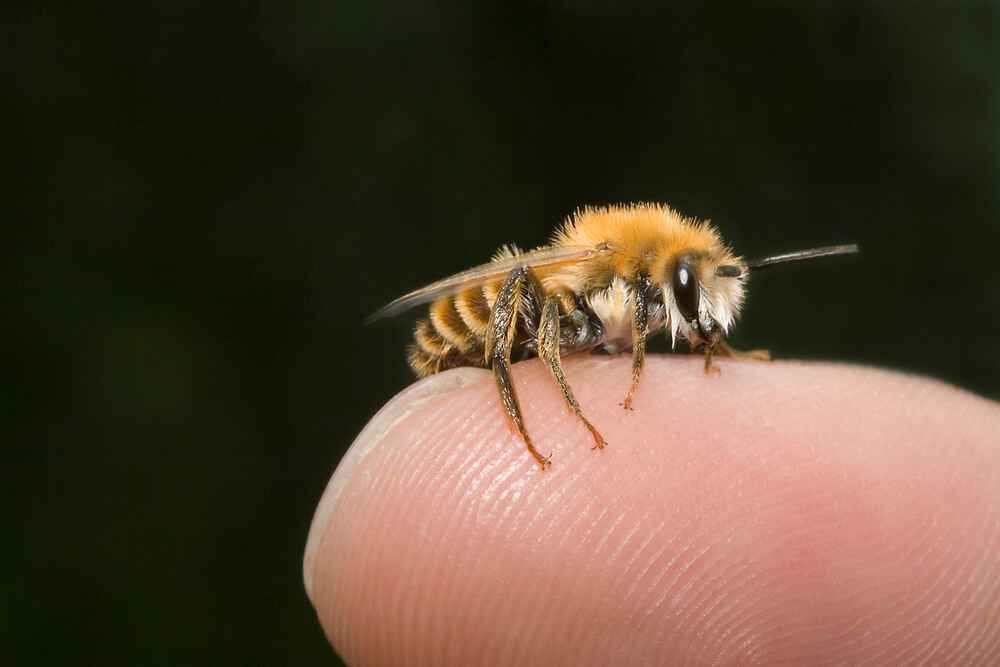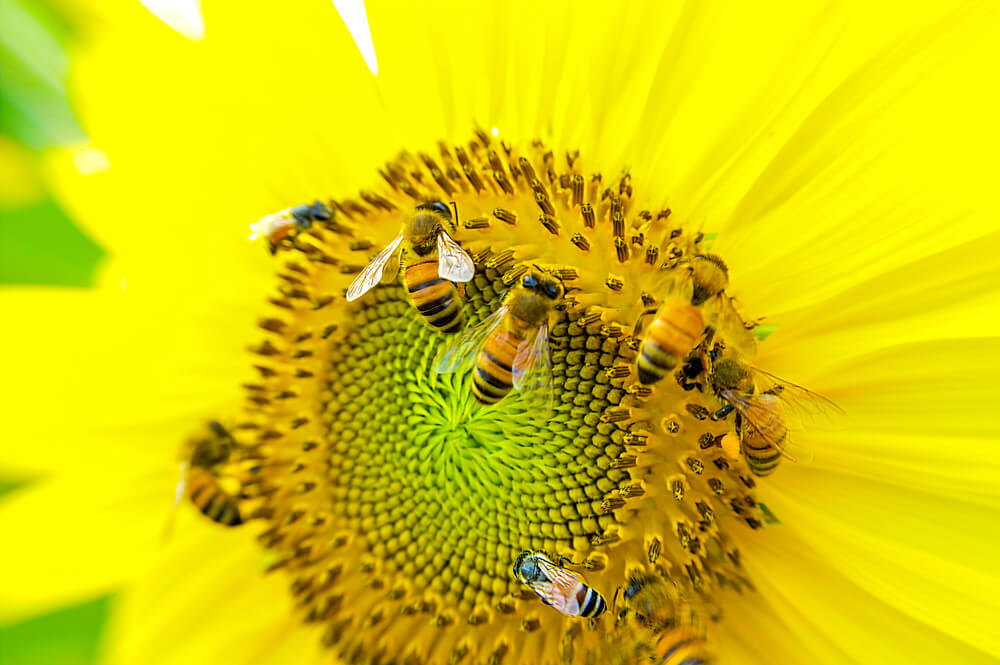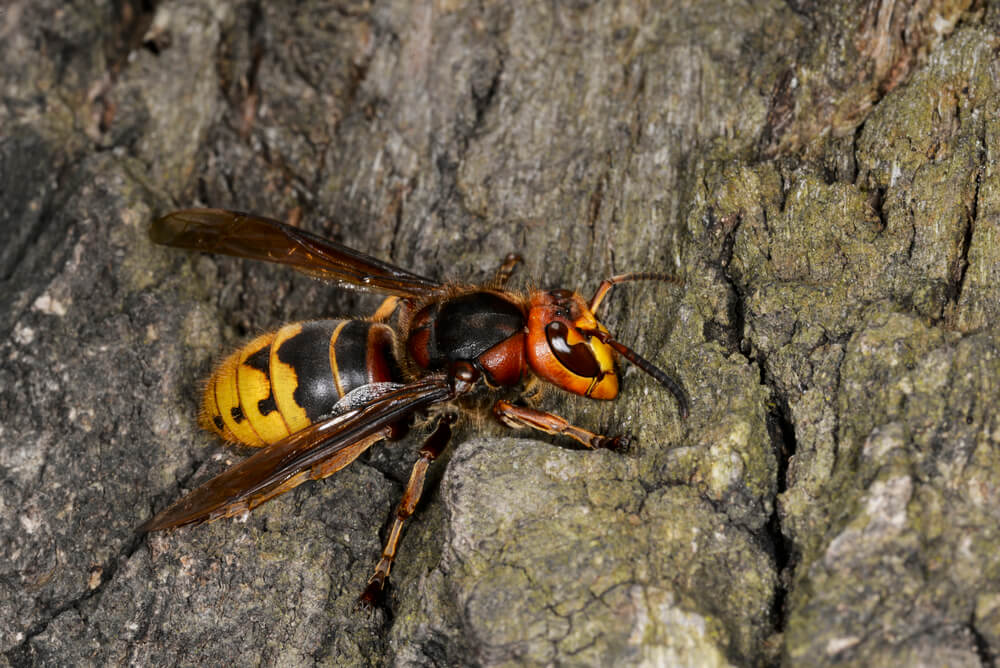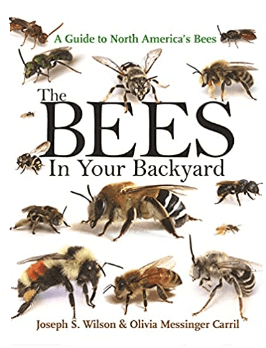In this article:
What Are Vulture Bees?
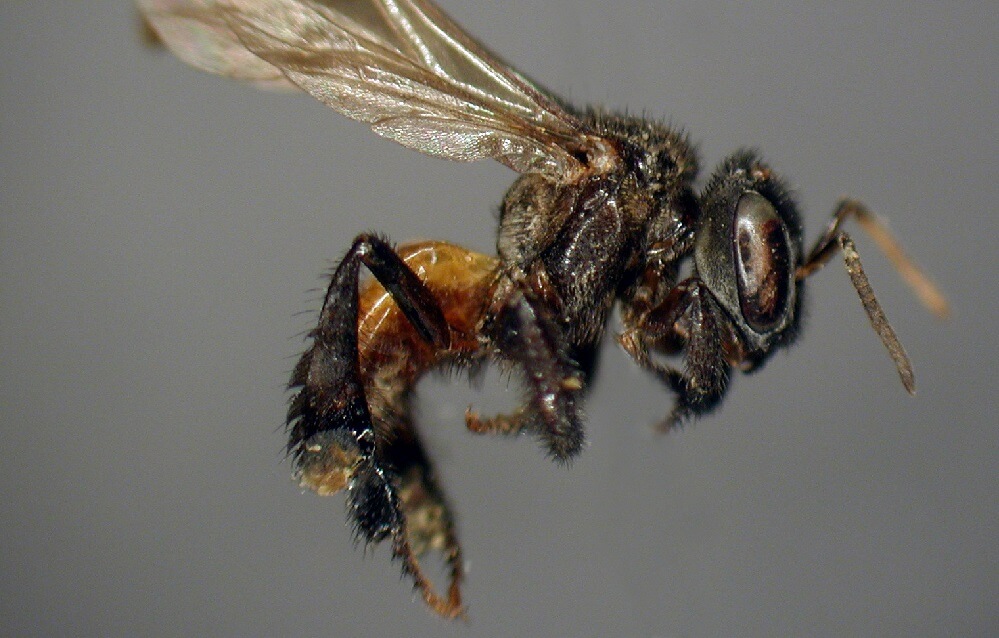
The secret’s out.
Vulture bees are South American bees that eat rotting flesh. They eat things like dead birds, lizards, toads, monkeys, and even snakes.
Wait a minute.
Bees that eat meat?
Yes, you read that right.
Vulture bees have evolved to eat meat instead of pollen like other bees. They were first given their scientific name, Trigona Hypogea, in 1902 by entomologist Filippo Silvestri.(1, 2, 3)
Here’s a video of vulture bees eating chicken that scientists provided:
Like maggots, vulture bees usually enter dead carcasses through their eyes or mouths.
And what happens next?
The vulture bees coat the meat with their saliva, which allows it to break down into a gooey substance they can swallow. Next, they take it back to the hive to make honey and feed their larva.
Didn’t know that was possible, did you?
But wait, let’s back up a bit.
Why Are Vulture Bees Attracted To Meat?
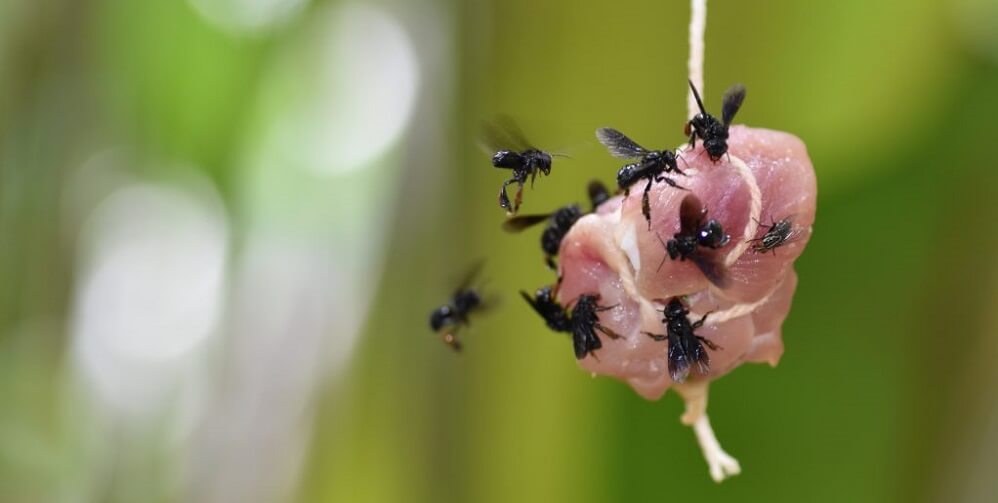
Other bees eat pollen and nectar… so why don’t vulture bees do the same?
It’s a good question.
But it’s one that we don’t necessarily have all the answers to yet. That said, researchers currently believe that vulture bees evolved to eat meat due to competition from other bees and lack of resources.(1)
Because let’s face it.
Competition for nectar and pollen is high. There are more than 20,000 bee species worldwide.(4, 5, 6)
Not to mention, other pollinators like butterflies, hummingbirds, wasps, and flies also compete for the same resources.
So scientists believe that vulture bees have evolved to have an extra tooth for biting into meat. They also produce special saliva that allows them to break down the meat so they can eat it.
And here’s the thing:
Vulture bees don’t have stingers.
This means they can’t hunt their prey and sting them, so they rely on the decaying flesh of dead animals.
And now, you might be thinking…
Are Vulture Bees Dangerous To Humans?
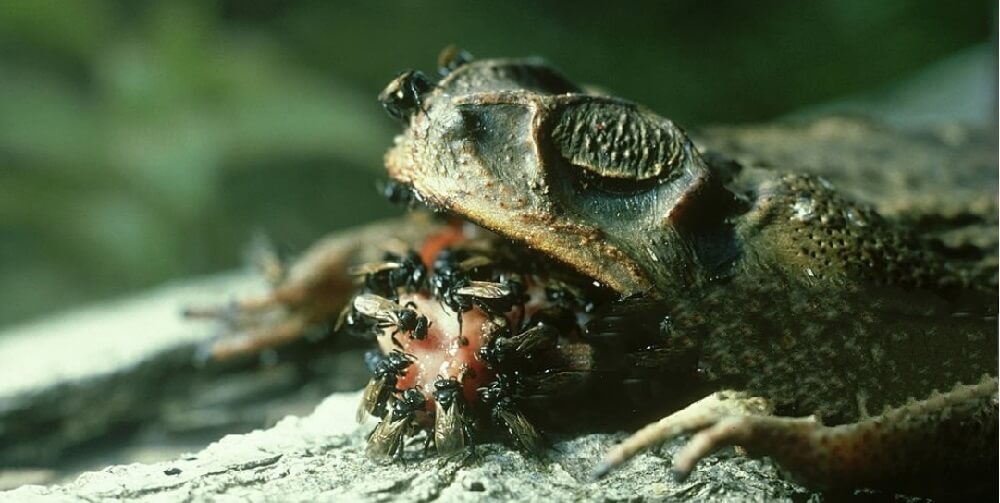
No. From the research scientists currently have, vulture bees seem passive-natured. They’re stingless bees, so you don’t have to worry about getting stung.
And much like honeybees, vulture bees live in hives with other bees.
Their hives include a queen bee who mates with male bees so she can lay eggs. The hive also includes female worker bees that forage for meat and make honey.
Wait, vulture bees make honey?
Yes. And the honey they make comes from the decaying meat they feast on.
So that brings us to the million-dollar question:
Is Vulture Bee Honey Safe To Eat?
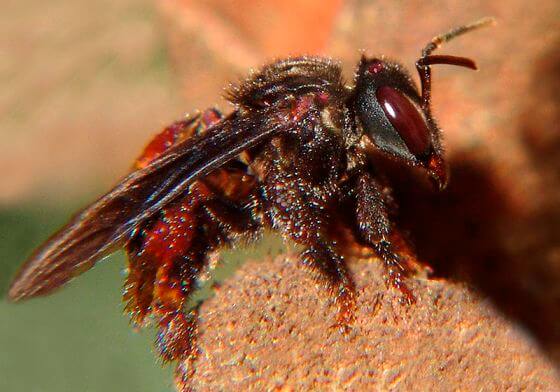
People often ask, “What does vulture bee honey taste like?” and “What’s the vulture bee honey flavor like?”
The answer?
It’s tough to say.
For starters, most people (including scientists and researchers) have never tried vulture bee honey. Vulture bees simply don’t produce enough honey to harvest.
Keep in mind:
Vulture bees aren’t like honeybees.
A healthy honeybee colony can produce up to 100 pounds of honey per year. That’s why the honey you see on grocery store shelves come solely from honeybees. No other type of bee can produce that much honey.
Secondly, vulture bee honey hasn’t been tested as safe for human consumption.
Since it’s made from rotten flesh, it could contain dangerous bacteria that are toxic to humans.
And finally?
Vulture bees need their own honey for survival.
Let me be clear:
Vulture bees don’t make honey for nothing. They use it to feed their larva (aka baby bees). Also, they probably use it to feed their queen and their hive when food supplies are low.
And because vulture bees don’t produce much honey in the first place, it’d be harmful and impractical to harvest it from them.
But warning:
Be wary of websites claiming to sell “vulture bee honey” or “meat honey.”
Interest in vulture bees has spread like wildfire, which opens the door for spammy websites to list “vulture bee honey for sale.” Don’t buy it because it’s probably fake.
Related: How Long Do Bees Live?
FAQs about Vulture Bees
- Do vulture bees bite humans?
- Do vulture bees nest in animal carcasses?
- Do vulture bees produce honey?
- Can humans eat vulture bee honey?
- What does vulture bee honey look like?
- When were vulture bees discovered?
- Do vulture bees have stingers?
- Are vulture bees carnivorous?
- Do vulture bees eat nectar?
- Do vulture bees eat pollen?
Do vulture bees bite humans?
While technically they probably can, it’s highly unlikely. Vulture bees are observed to be passive bees that aren’t territorial.
There also haven’t been many reports indicating that they regularly bite humans. But of course, more research is needed.
That said, here’s what entomologist Doug Yanega had to say about vulture bee bites:
“They range from species that are genuinely innocuous to many that bite, to a few that produce blister-causing secretions in their jaws, causing the skin to erupt in painful sores.”
—> Go back to the FAQs about vulture bees
More to Explore:
Do vulture bees nest in animal carcasses?
No, there is no evidence to suggest that vulture bees build their hives inside dead animals.
So, where do vulture bees live? What’s the vulture bees’ location?
Like most bees, they build their nests in open cavities above or underground. Cavities include tree hollows, log hollows, or empty rodent holes. Vulture beehives are usually built in areas that keep them concealed from predators.
—> Go back to the FAQs about vulture bees
More to Explore:
Do vulture bees produce honey?
Yes, vulture bees make honey from the meat that they eat. This is why some people refer to it as “meat honey.”
But remember:
Vulture bee honey isn’t made from nectar like honey from honeybees.
So how do vulture bees make honey, you ask?
They have a special fluid that they secrete from their mouths that helps them break down the meat. From there, they use their teeth to slice parts of the meat and carry it back to their hive.
Once back at the hive, vulture bees put the meat into small “pots” where it’s left to cure for two weeks. It’s made into vulture bee honey and fed to their larvae.
—> Go back to the FAQs about vulture bees
More to Explore:
Can humans eat vulture bee honey?
You’re probably wondering:
What does vulture bees’ honey taste like? Is the honey from vulture bees edible?
The answer is this:
It’s not recommended that humans eat vulture bee honey.
How come?
Well, a few reasons.
For one, meat-eating vulture bees don’t make much honey in the first place. They aren’t like honeybees – who can make between 50-100 pounds of honey per year.
Instead, vulture bees make just enough honey for their colony and baby bees. So harvesting enough vulture bee honey to consume would be a tough task since there isn’t much of it in the first place.
Secondly, vulture bee honey hasn’t been studied or tested in a lab.
Remember:
Vulture bees feed on dead animals. This means vulture bee honey can possibly contain bacteria harmful to humans.
And finally?
It’d be unethical and impractical to try to harvest vulture bee honey. Vulture bees make honey because they need it. They don’t have much to spare, so we could be doing them a major disservice by stealing their honey.
—> Go back to the FAQs about vulture bees
More to Explore:
What does vulture bee honey look like?
Unfortunately, scientists haven’t given specifics of what vulture bee honey actually looks like. If we had to speculate, we’d assume that it looks similar to regular honey with a rich golden brown color.
—> Go back to the FAQs about vulture bees
More to Explore:
When were vulture bees discovered?
Vulture bees were first discovered as flesh-eating bees in 1982 by entomologist David Roubik.
That said, two other reported examples of carnivorous bees were reported in 1758 and 1827. These two reports involved bumblebees feeding on dead animals.(7)
Also, some bee species have been known to sometimes feed on flesh in addition to both nectar and pollen. These are considered “facultatively necrophages,” which is a scientific term that means they eat pollen, nectar, and decaying meat.
On the other hand, vulture bees are considered “obligate necrophages” because they only eat meat.
Currently, only three vulture bee species are known to exist.
The three species in the vulture bee group are:
- Trigona crassipes (Fabricius, 1793)
- Trigona necrophaga (Camargo & Roubik, 1991)
- Trigona hypogea (Silvestri, 1902)
So now you might be asking:
How were vulture bees studied?
It started with a team of researchers traveling to Costa Rica to observe them. Vulture bees are found in South American jungles, and they typically feed on dead lizards and snakes.
But here’s the thing:
When it comes to meat, vulture bees aren’t too picky.
So the researchers bought some raw chicken and hung it from branches in trees. To repel ants, they rubbed petroleum jelly on the string used to hang the chicken.
The vulture bees took to the chicken within a day. The researchers trapped about 30 vulture bees in glass vials while they were eating.
The vulture bees were then stored in alcohol, preserving their DNA and microbes in their guts. This also allowed the scientists to identify which types of bacteria they hosted in their bodies.
The guts of vulture bees had bacteria similar to those found in hyenas and vultures. Like vulture bees, both hyenas and vultures both eat rotting meat.
The group of researchers then documented their findings in the journal mBio.(1)
—> Go back to the FAQs about vulture bees
More to Explore:
- Honeybees vs. Bumblebees: How Do They Compare?
- How Many Eyes Do Bees Have?
- Do Carpenter Bees Pollinate?
Do vulture bees have stingers?
No, vulture bees are stingless bees which means they don’t have stingers. They’re also reported to be docile bees that are unlikely to bother humans.
Fun fact:
There are more than 500 stingless bees species. They live primarily in tropical and subtropical areas like Australia, South America, Africa, and Southeast Asia.(8)
In these warm climates, the bees are usually active all year round.
—> Go back to the FAQs about vulture bees
More to Explore:
Are vulture bees carnivorous?
Yes, vulture bees eat meat.
We frequently get asked:
Why do bees eat meat? Why do bees like dead animals? Are bees carnivores?
The truth is that most bees don’t eat meat. They eat pollen and nectar from blooming flowers. Sometimes they’ll also eat ripe fruit if nectar sources are low. Or, they’ll eat their own honey stores like bumblebees and honeybees do.
Vulture bees are a unique type of bee that eat meat.
Don’t forget:
There are more than 20,000 bee species worldwide. With that in mind, there are only three known vulture bee species:
- Trigona crassipes (Fabricius, 1793)
- Trigona necrophaga (Camargo & Roubik, 1991)
- Trigona hypogea (Silvestri, 1902)
Since vulture bees only account for three species that we know of, they’re a meat-eating exception. They’re the only bees to make meat honey (aka vulture bee honey).
—> Go back to the FAQs about vulture bees
More to Explore:
Do vulture bees eat nectar?
Yes, they get nectar from the leaves and stems of some plants. This is considered “extrafloral nectar,” which happens outside of the flower instead of inside the flower.
Extrafloral nectaries attract insects, but not for pollination. Instead, they attract insects that help protect the plant. For example, they often attract ants that deter caterpillars from eating the plant.
—> Go back to the FAQs about vulture bees
More to Explore:
- How to Keep Bees Away From Hummingbird Feeders
- Do Sweat Bees Sting?
- Wasps vs. Honeybees: How Are They Different?
Do vulture bees eat pollen?
No, meat replaces the need for vulture bees to eat pollen.
You see, in most bees, pollen is their main protein source. But with vulture bees, they get protein from meat just like humans do.
Also, since vulture bees have evolved to eat meat, they no longer have the ability to carry pollen like other bees do.
Honeybees, for example, have pollen baskets on their hind legs where they store pollen to bring back to their hive.
Here’s what pollen baskets look like:
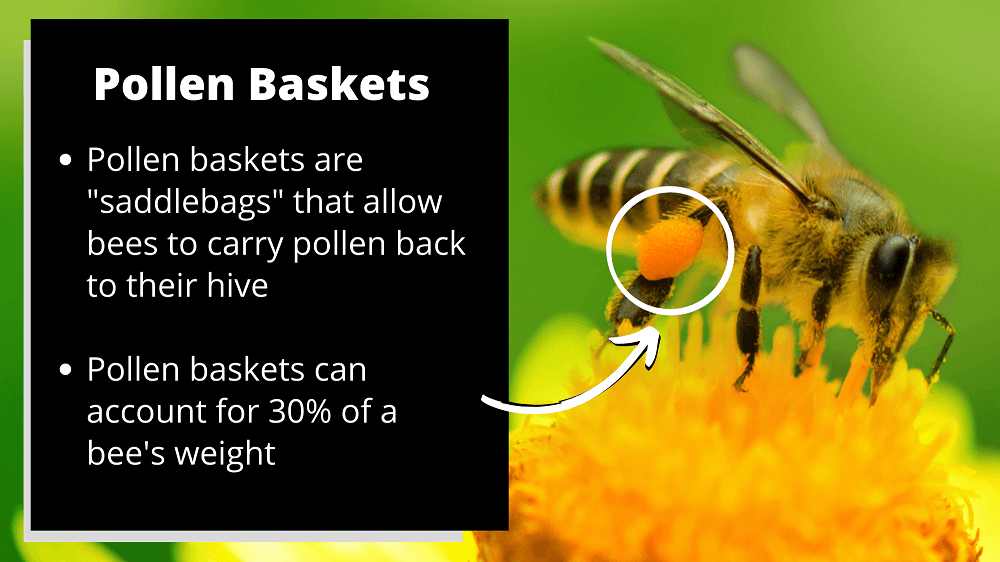
Instead, vulture bees have meat baskets they use for storing meat. Once back at their hive, they use the meat to feed their young.
